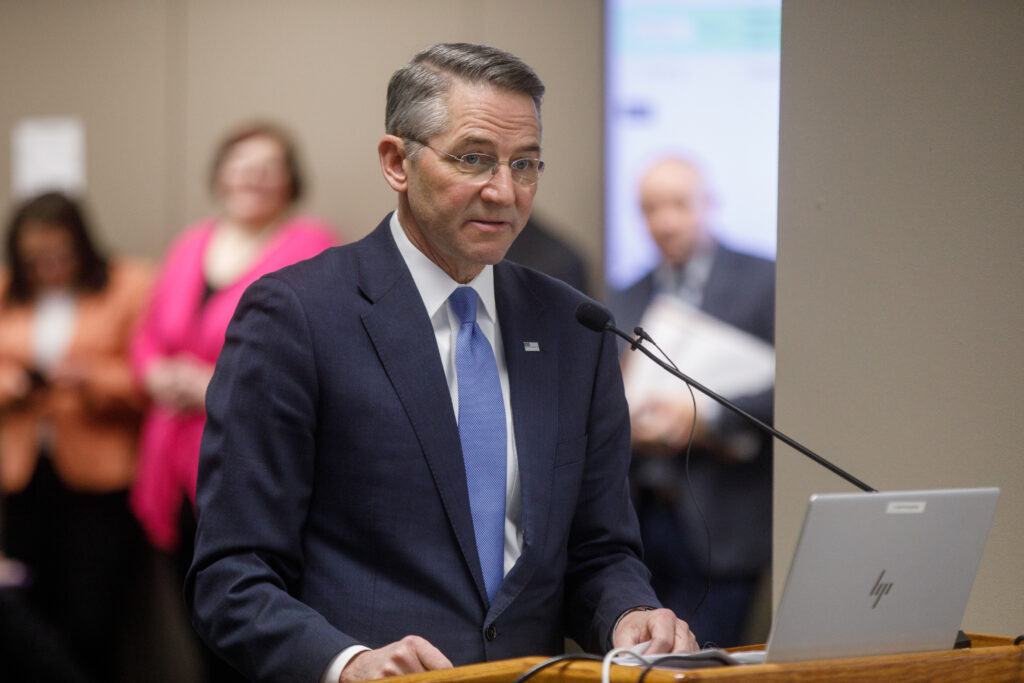Attorney General Drew Wrigley testifies to a legislative committee on March 24, 2025. (Kyle Martin/For the North Dakota Monitor)
North Dakota Attorney General Drew Wrigley said Monday he does not see a legal option for suing the state of South Dakota over that state’s eminent domain law regarding carbon dioxide pipeline projects.
Wrigley had made comments on a Fargo-based radio station earlier this month that he felt a South Dakota law enacted earlier this year may infringe on interstate commerce and was researching possible legal action.
“Our conclusion has been that there is not, at this time, a legal avenue available to us,” Wrigley told the North Dakota Monitor on Monday.
Carbon pipelines have become a hot political topic in the two states in recent years as Iowa-based company Summit Carbon Solutions seeks to build a multi-state pipeline to capture carbon emission from ethanol plants. Summit plans a network of pipelines that would send the CO2 to an underground permanent storage area in western North Dakota.
Summit has obtained pipeline route and storage permits in North Dakota. South Dakota has thus far denied Summit a route permit and the South Dakota Legislature passed a law making it harder for CO2 pipeline companies to obtain easements from landowners.
The South Dakota law, signed in March by Gov. Larry Rhoden, forbids companies such as Summit from using the legal tactic of eminent domain to force landowners to provide right-of-way for a carbon pipeline.
Wrigley called the South Dakota legislation “a bad policy choice” and a “hostile act” against North Dakota in an interview with Scott Hennen on WZFG, The Flag, based in Fargo.
South Dakota political leaders defended the legislation after Wrigley’s comments circulated, saying its Legislature was standing up for the property rights of citizens.
Wrigley, who voted for Summit’s CO2 sequestration permit as a member of North Dakota’s Industrial Commission, did not mention Summit in the interview.
The main trunk of Summit’s pipeline would run through South Dakota.
Last week, David Owen, president of the South Dakota Chamber of Commerce before retiring earlier this year, told a panel at the Greater North Dakota Chamber’s annual policy summit that the idea Summit could route its pipeline through South Dakota without eminent domain was a “fantasy.”
Summit recently has been trying to alter the terms of its pipeline permit in Iowa. It has obtained a permit for a small section of its route in Minnesota, which also does not allow eminent domain for CO2 pipelines. Nebraska does not have a state agency with authority over carbon pipelines.
Wrigley on Monday also highlighted North Dakota’s role in siding with property owners on an eminent domain case with the U.S. Supreme Court. North Dakota and South Dakota were among 12 Republican-led states that earlier this month filed a friend-of-the-court brief taking the side of landowners as they seek to be reimbursed for legal fees after winning a court battle with an energy company.
“There’s a lot of interest in pipelines and transmission lines, things that impact private property rights,” Wrigley said. “I am a strong private property rights advocate.”
Reach North Dakota Monitor Deputy Editor Jeff Beach at jbeach@northdakotamonitor.com.
This story was originally produced by North Dakota Monitor, which is part of States Newsroom, a nonprofit news network which includes South Dakota Searchlight, and is supported by grants and a coalition of donors as a 501c(3) public charity.





